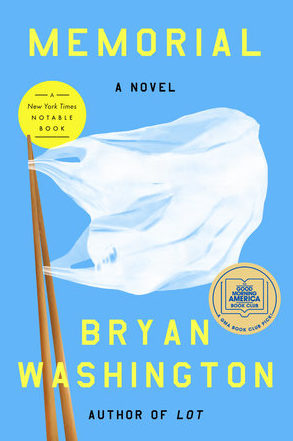Memorial
by Bryan Washington
reviewed by Maria Marchinkoski
Bryan Washington’s rise to literary fame began in 2019 with the publication of Lot, his first short story collection, and has shown no signs of abating. Lot garnered critical praise and earned a coveted position on Barack Obama’s list of his favorite books of the year. Washington’s first novel, Memorial, seems to be on a similarly acclaimed trajectory.
Like his short fiction, Memorial concerns the lives of gay men in Houston. Benson, a Black daycare teacher, and Mike, a Japanese American chef, spend their first few years together having good, impassioned sex and eating the meals Mike prepares for them. Their relationship, however, is less idyllic than that portrait suggests. They argue, often about nothing. Sometimes those arguments get violent. They also have different, vague ideas about what constitutes fidelity.
The fissures in their relationship come to a head when Mike announces he will spend “just … a few weeks” or “maybe a couple of months” in Osaka with his dying father while his mother, Mitsuko, travels to Houston to take his place. With the improbable domestic dramedy set—Benson living with his boyfriend’s foreign mother, whom he’s never met, and Mike living with his until recently estranged father in Osaka—both men take stock of their relationship, whether they want it, and whether they can stand to do without it.
The book is split into three sections: Benson narrates the first half of the book and Mike the second, with Benson rounding out the novel. The differences between these sections are few: Benson narrates in the present tense, Mike in the past. Otherwise, they share a narratorial style, diction, and tendency to swear. (“The first thing I think,” says Benson in the novel’s first few lines, “is: fuck.” When Mike describes his father moving about his apartment, he is “slow to sit on the fucking sofa.”) They also share struggles. Both are frustrated by gentrification and ambivalent about the influx of white neighbors into Houston’s Black neighborhoods. Both pursue sex outside their relationship and deal with the complications and guilt that result. Both have distant but loving mothers and ill, homophobic fathers. (Mike’s father has terminal cancer; Benson’s suffers from panic attacks and alcoholism.)
Readers familiar with Washington’s work will recognize the unadorned, authentic prose style of Memorial. It is stripped down, so much so that the appearance of an adjective like beatific—used in one of the novel’s final moments—carries the lyrical weight that a word like beatific should.
Benson and Mike even respond to traumatic revelations in the same language. When he learns that Mike might move to Osaka, Benson narrates: “And then. And then. And then slowly, suddenly, I’m asleep and when I wake up, it’s six in the morning.” When Mike discovers his father has died, he narrates: “And then, and then, and then. One night, I woke up for a piss, and I heard the silence.”
At first glance, these similarities might indicate that Benson and Mike are flat characters. The truth is that, while Benson and Mike do narrate in an almost identical style, their shared idioms and outlooks illustrate the many, often ineffable ways a long-term relationship with another person—romantic or familial—can condition how we think and feel.
This isn’t accidental. A breakthrough for Benson comes when Mitsuko, Mike’s mother, teaches him how to cook well for himself. Memorial takes all the axioms about cooking and independence and demonstrates why they are axioms in the first place. It also treats food as the centerpiece between people who care for one another but who might not have the language yet to express it. The novel is as much about coming to awareness of codependency—and its pleasures and pitfalls—as it is about representing the pivotal moment when a relationship might survive or enter free fall.
There are no antagonists in Memorial, not even homophobic fathers. The fact that Mike and Benson seem to repair those relationships implies that the damage these fathers have done to themselves—and that their own bodies have done to them—has sufficed. As in Washington’s short fiction, no one character is beyond forgiveness.
Still, I’m not convinced that this is a happy or uplifting novel. The story is too measured for that, and things are no less complicated by its end. Instead, I’m convinced by Washington’s candor, his characters, and the openness with which he approaches them.
Published on February 5, 2021

